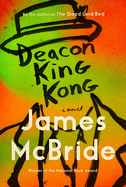
In Deacon King Kong, National Book Award-winner James McBride (The Good Lord Bird, Five-Carat Soul) delivers a multilayered portrait of life in the projects during the Civil Rights era. It begins like any other fall day in 1969 at Brooklyn's Causeway Housing Projects (aka the "Cause"), "where 3,500 black and Spanish residents crammed their dreams, nightmares, dogs, cats, turtles, guinea pigs, Easter chicklets, children, parents, and double-chinned cousins from Puerto Rico, Birmingham, and Barbados into 256 tiny apartments." It's unremarkable until Deems Clemens, a 19-year-old baseball prodigy-turned-drug dealer, has his ear shot off in the project's central plaza. And no one can believe that the man who pulled the trigger, in his tattered jacket and pork pie hat, is old Sportcoat.
Sportcoat was a deacon at the Five Ends Baptist church and Deems's baseball coach; everyone liked him, even if he was frequently soused on "king kong" moonshine he shared with his buddy Hot Sausage. Sportcoat himself can't remember, let alone explain, why he shot Deems. But the series of events this act sets in motion reveals long-held secrets and surprising intersections with white folks outside the Cause, including The Elephant, a powerful but vulnerable mobster, and Potts, a tired cop who comes alive at the sight of the church's mighty Sister Gee.
While readers witness "the sadness, the suspicion, the weariness" that comes with life in the projects, McBride populates the Cause with characters who persevere with love and compassion for each other, unwavering faith in God and community, and lots of humor. Big-hearted and sprawling, Deacon King Kong cements McBride as a master storyteller. --Frank Brasile, librarian

